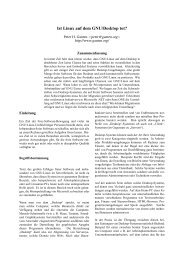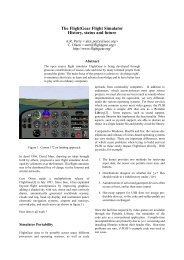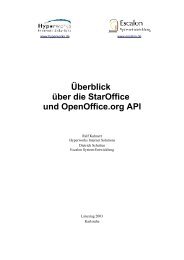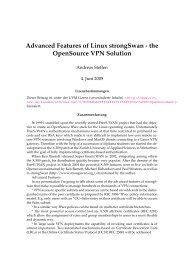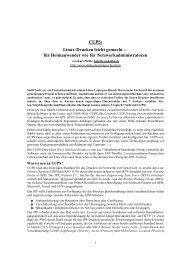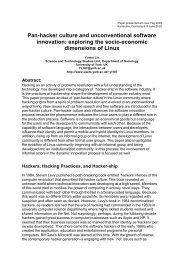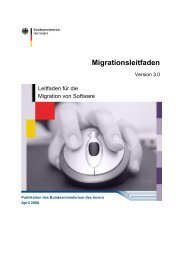Create successful ePaper yourself
Turn your PDF publications into a flip-book with our unique Google optimized e-Paper software.
data is of fixed size. There<strong>for</strong>e, all underlying devices of a logical volume must accept I/O requests of the same<br />
size. All that the volume manager needs to do <strong>for</strong> any I/O request is to determine which device in the logical<br />
volume the I/O should go to and recalculate the start block of the new device. Each I/O request is directed wholly<br />
to a new device.<br />
The <strong>XFS</strong> file system, however, does not assume fixed size I/O. In an <strong>XFS</strong> file system, metadata can be anywhere<br />
from 512 bytes to over 8 Kbytes. The basic minimum I/O size <strong>for</strong> user data is set at file system creation time, with<br />
a typical installation using 4 Kbytes. One of the <strong>XFS</strong> design goals was to aggregate I/O together, creating large<br />
sequential I/O.<br />
This feature of <strong>XFS</strong> created a problem <strong>for</strong> <strong>Linux</strong> volume managers, since the <strong>XFS</strong> file system can hand an I/O<br />
request off to a block device driver specifying the start position and length, which is not always fixed. A logical<br />
volume manager is just another block device to <strong>XFS</strong>, and a logical volume manager working in conjunction with<br />
<strong>XFS</strong> needs to be able to handle whatever size I/O request <strong>XFS</strong> desires, to some reasonable limit.<br />
One of the options to address this problem in <strong>XFS</strong> is to change the on disk <strong>for</strong>mat of the file system to use a fixed<br />
size. This would render the <strong>Linux</strong> version of <strong>XFS</strong> incompatible with the current IRIX implementations, however,<br />
and so it was deemed unacceptable, just as making different versions of NFS would be unacceptable.<br />
The <strong>Linux</strong> 2.4 version of <strong>XFS</strong> working around the problem of variable I/O request size by opening a device with<br />
the minimum I/O size needed: 512 bytes and per<strong>for</strong>ming operations in multiples of this size anyway unless the<br />
underlying device is in a blacklist of volume manages that can’t handle these I/O request.<br />
In <strong>Linux</strong> 2.5 the new block layer interface allows to submit variable-sized requests and the burden of splitting<br />
them up is up to the actual volume managers.<br />
Moving <strong>XFS</strong> to Open Source<br />
For <strong>XFS</strong> to be a viable alternative file system <strong>for</strong> the open source community, it was deemed essential that <strong>XFS</strong><br />
be released with a license at least compatible with the GNU General Public License (GPL).<br />
The IRIX operating system in which <strong>XFS</strong> was originally developed has evolved over a long period of time, and<br />
includes assorted code bases with a variety of associated third party license agreements. For the most part these<br />
agreements are in conflict with the terms and conditions of the GNU General Public License.<br />
The initial <strong>XFS</strong> project was an SGI initiative that started with a top-to-bottom file system design rather than an<br />
extension of an existing file system. Based upon the assertions of the original developers and the unique features<br />
of <strong>XFS</strong>, there was a priori a low probability of overlap between the <strong>XFS</strong> code and the portions of IRIX to which<br />
third-party licenses might apply. However it was still necessary to establish that the <strong>XFS</strong> source code to be open<br />
sourced was free of all encumbrances, including any associated with terms and conditions of third party licenses<br />
applying to parts of IRIX.<br />
SGI’s objectives were:<br />
• to ensure the absence of any intellectual property infringements<br />
• to establish the likely derivation history to ensure the absence of any code subject to third party terms and<br />
conditions<br />
7



